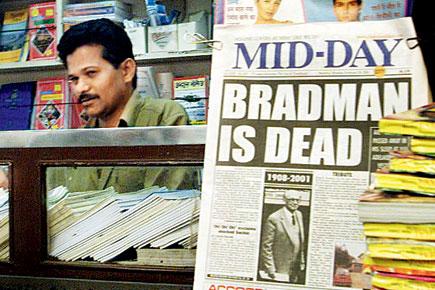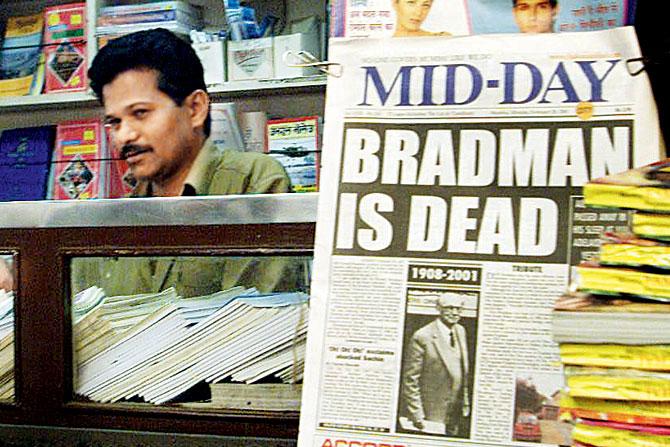Fifteen years to the day, the cricketing world witnessed Sir Don’s final farewell right in the midst of an India vs Australia Test series in 2001

 "Don Bradman is dead." A nap in the comfort of my editor’s cabin was interrupted with these words deep into the night of February 25, 2001.
"Don Bradman is dead." A nap in the comfort of my editor’s cabin was interrupted with these words deep into the night of February 25, 2001.
ADVERTISEMENT
A colleague who was monitoring news for the next day’s first edition of mid-day, had just profited from using the Internet and not the news wires for updates. Cricket’s greatest innings had ended. As an afternoon newspaper in those days, this was right up our street. This was front-page stuff.
Our night duty didn’t end when the first edition went to bed. There was of course the second edition and with Steve Waugh’s Australians in town for the opening Test of the fourth Border-Gavaskar Trophy series, there was a clutch of stories to do that morning. Photographer MM Shirodkar and I headed for the Taj. At 7.15 am, the lobby was expectedly empty and the Indian and Australian teams were still a good couple of hours away from leaving for their pre-Test nets at the Wankhede Stadium.

A newspaper stall at CST displays the afternoon edition of mid-day announcing the death of Sir Don Bradman on February 25, 2001 at the age of 92. file Pic/Getty Images
My first priority was to get a reaction from Sachin Tendulkar in time for the second edition. Less than three years ago, Tendulkar had met Bradman at his Adelaide home and no other modern player was linked to Bradman like him.
For some reason, I carried a print of our page one and an Australian television channel requested Shirodkar and myself to give them a few bytes with us holding the print. Shirodkar’s "Bradman-was-the-father-of-cricket" quote was impressive but this was no time to be amused.
It was now a better time to call Tendulkar through the house phone. He picked up after a few rings and his “hello” left me with no doubt that I had woken him up. He could have thrown a tantrum even before I gave him the reason for the call. After all, it was the morning before the next day’s Test match and he could have spent a good part of the night thinking about how to tackle McGrath and Gillespie; Fleming and Warne. But there was not a hint of annoyance.
He was understandably lost for words. “Indeed, this is very, very sad. A very sad day,” he said before emphasising how the trip to Bradman’s home in 1998 was an unforgettable moment.
Meanwhile, the Australian Cricket Board’s media manager Brian Murgatroyd had organised Steve Waugh and Shane Warne to speak to the media. Several hours ago, Murgatroyd had slipped notes under the room doors of the Australian team, informing them about Bradman’s demise. Some of them had already heard it. Warne was informed by Channel Nine reporter Andrew Mcinlay and vice-captain Adam Gilchrist was woken up by a radio station in Adelaide at 3 am India time. Waugh’s wife called him at 2:15 am and then, in his own words, he got “a steady strings of calls after that.”
Suddenly, Waugh’s Final Frontier had sadness wrapped around it although the Australian captain dismissed suggestions of the Test being postponed and that Bradman would never have liked it. Bradman’s death probably caused Waugh to become more reflective. “It’s a wake-up call for all who are playing cricket - to play it for the right reasons and to look to the future of the game rather than our own needs,” he told a small group of journalists at the Taj poolside. Little did he realise that in a few days’ time his teammate, Michael Slater would do something that the departed icon would have frown upon. Slater thought he caught Rahul Dravid in the second innings but umpire S Venkataraghavan didn’t think so. Slater made a huge fuss about it and even displayed his utter frustration to the batsman.
Both teams wearing black arm bands to mourn Bradman’s death was expected but not Waugh’s decision to put India in. He was proved right.
India’s top order was flattened, but Tendulkar pulled no punches even at 55 for four. If there was a rating on Tendulkar’s 100-less innings, his 76 would be up there for discussion. Peter Roebuck’s Day One dispatch to the Sydney Morning Herald was all about Tendulkar: "Repeatedly Tendulkar played defensive strokes at apparently well-pitched deliveries and it came as some surprise to see the ball charging away to the boundary behind the bowler. Two of these shots were played off the back foot and each time watchers expected the bowler to bend to collect the gentle return. No such luck. Everyone gasped as the ball went speeding away across a large outfield with Australians in hot pursuit."
Grief wore out in the heat of the Mumbai Test battle. It was an exciting Test match no matter how comprehensive Australia’s 10-wicket victory appeared on the score sheet. It went on to be one of India’s best home series and it changed India-Australia cricket rivalry forever. Leave aside the individual brilliance of Gilchrist, Hayden, Harbhajan, Waugh, Laxman and Tendulkar over three Tests, the fact is that the series was decided in the last hour of the scheduled closure. The exciting series was played in a manner he liked, won by a country he refused to set foot on despite being so revered here.
Fifteen years after his death, I am reminded what cricket historian Vasant Raiji wrote in a booklet called, The Unseen God: "Indians worship a multitude of gods. In Sir Donald Bradman they have their God of cricket. God is perfect. In the eyes of the Indians, Bradman is the perfect batsman. God is unseen. Indians have not seen Bradman play. God’s ways are inscrutable. Indians cannot comprehend why, in spite of numerous pressing invitations, Bradman never came to India. Whatever happens is God’s will. So if Bradman avoided India, it was Bradman’s will. Disappointment, but no ill-feeling or rancour."
mid-day's group sports editor Clayton Murzello is a purist with an open stance. He tweets @ClaytonMurzello
Send your feedback to mailbag@mid-day.com
 Subscribe today by clicking the link and stay updated with the latest news!" Click here!
Subscribe today by clicking the link and stay updated with the latest news!" Click here!






